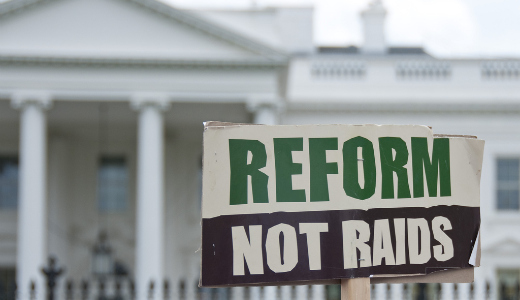
The recent elections, in which the Republicans won a majority in the House of Representatives and in some state legislative bodies, while the Democrats retained the Senate with a reduced majority, was a blow against comprehensive immigration reform.
The immigrants rights movement, however, which put millions of demonstrators onto the streets in 2006 and 2007, and brought a quarter of a million onto the Washington Mall in March of this year, is not hauling down its flag.
The Republican Party scurrilously attacked immigrants and their political supporters throughout the 2010 campaign. In some cases, this worked: Republican Governor Janet Brewer of Arizona, who had been trailing in the polls, managed to get re-elected by an immigrant-bashing campaign which included signing the anti-immigrant SB 1070. One of the worst anti-immigrant demagogues in the country, Hazleton, Pennsylvania Republican Mayor Lou Barletta, was elected to the House of Representatives.
Though most congressional and Senate supporters of progressive immigration reform survived the elections, some didn’t, including Texas Democrat Solomon Ortiz, chief sponsor of the main comprehensive immigration reform bill in the House, HR 4321.
A key figure in the immigrant rights struggle, Arizona’s Democratic Congressman Raul Grijalva, was thought to be in trouble when he was targeted by the Tea Party. A remarkable local and national mobilization pulled it out for him on Election Day.
In some cases the Republican anti-immigrant campaign backfired. At least three Senate seats were retained by the Democrats in large measure by a big outpouring of the Latino vote. These included Barbara Boxer in California, Harry Reid in Nevada and Michael Bennett in Colorado. This also helped Democrat Jerry Brown to win the governorship of California.
This support by Latino voters for the Democrats was inspired by other bread and butter issues also. But immigration was a major part of it in an election in which there was a low turnout among other population sectors which elected Obama in 2008. It is all the more remarkable because immigrant rights activists and Latinos had been frustrated by the slowness with which Obama administration and the Democratic leadership in Congress had pushed immigration reform.
What now? As a practical matter, unless something can be accomplished in the lame duck session of Congress, the chances of passing comprehensive immigration reform in the next two years seem to be worse than ever.
In Republican led state legislatures, bills are going to be introduced that require police to stop anybody they suspect is an undocumented immigrant, that demand to see proof of citizenship or legal residency, and that hand the person over to immigration authorities if such proof is not provided. Debbie Riddle, a Republican member of the Texas State House, is reported to have slept in the hallways of the State Capitol in Austin so she can be first in line to submit a bill similar to Arizona’s SB 1070.
The movement to strip citizenship from children of undocumented immigrants born in the United States seems to be gaining steam. Anti-immigrant bills in Congress, of which there are a huge number, will now advance under the Republican leadership of the House of Representatives, having been stopped by Speaker Pelosi up to now.
Up to now, the Obama administration has continued a policy of cracking down on undocumented immigration, telling the immigrants’ rights movement that this is necessary to convince the Republicans that it is serious about enforcing the nation’s laws, and thus softening them up to the point that they support the legalization of the 10.8 million undocumented immigrants which the Department of Homeland Security says are in this country.
That strategy, however, has not worked: The government is now deporting 400,000 people or more per year, but the Republicans have moved away from supporting any kind of humane reform, based on their electoral calculations for 2012.
There will be a push for some sort of pro-immigrant legislation during the lame duck session; in the Senate this will include the DREAM Act; in the House it might include comprehensive reform.
Democratic U.S. Representative Mike Honda of California says he is going to re- introduce his “Reuniting Families Act” which will make it easier for families to be reunited through an expedited process of legalizing undocumented family members in the United States
None of these initiatives will prosper, and new anti-immigrant measures will not be stopped, without the active support not only of the immigrants’ rights movement and labor and other allies, but of all progressive people.
Image: SEIU // CC BY-NC-SA 2.0










